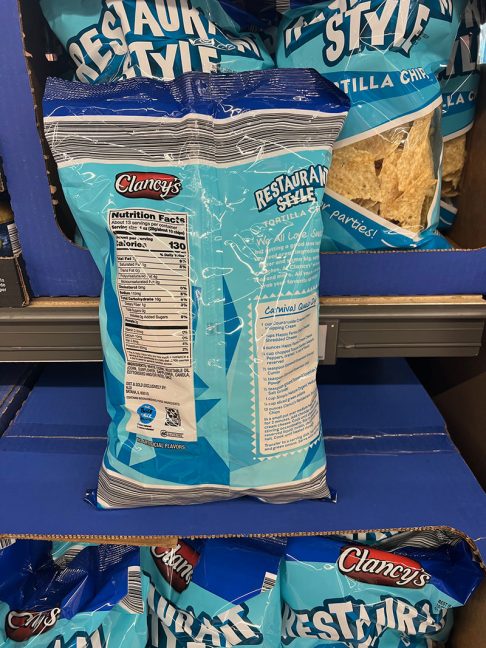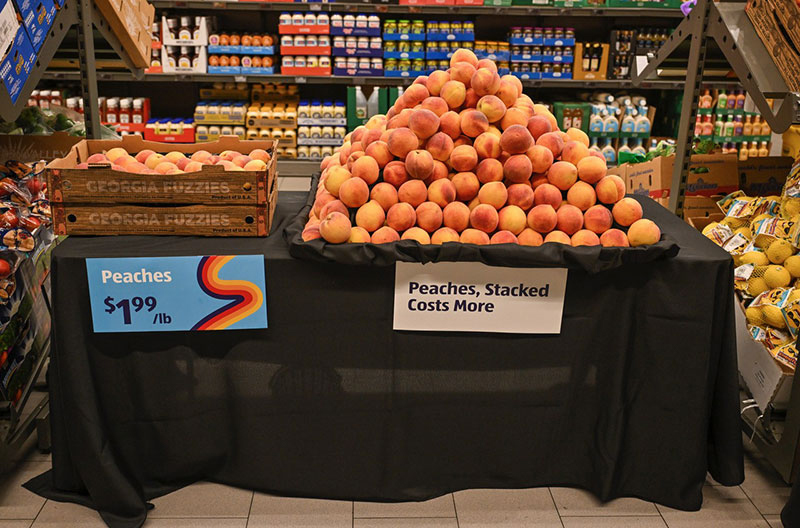Aldi hosted a behind-the-scenes tour of its store in the Buckhead neighborhood of Atlanta on July 17 to communicate how it can save area shoppers money – it estimates up to 40 percent – on groceries.
The tour was hosted by Shaun O’Keefe, regional VP based out of the Aldi’s Jefferson, Georgia, distribution center.
“What does Aldi do to help combat inflation? What do we do to help keep our prices low and help save shoppers money on their groceries?” Those were the questions O’Keefe set out to answer.
The money-saving practices begin before customers walk through the doors. The 25-cent cart rental corral just outside the store’s front doors means that there is no need for a team member to go and gather carts. It also means an unobstructed parking lot and a much lower chance of a runaway cart damaging vehicles.
“We don’t deal with much of that,” he said of vehicle dings. “If you’re pulling up to our stores, you’re not going to see carts out in the parking lot; you’re going to see a nice, clean look. We also haven’t had to spend any labor through just having a simple quarter cart system.”
In the produce department, with Georgia peach season in full swing, O’Keefe showed a peach pyramid versus a flat.
“We’re in Georgia, and we love peaches in Georgia, so we decided to build ourselves a peach pyramid. Y’all take a look at this beautiful pyramid that you might see built up in other traditional grocery store,” O’Keefe said.
“What you don’t see when you’re looking at this is the labor it takes to build a huge pyramid that looks beautiful, or what it would take to maintain that display throughout the day to keep it looking perfect. As soon as somebody buys a peach off there, then you’ve got to put another one on there, or at least somebody does.”
That cost will have to be built into the price of the peaches.
“We stock our peaches in the box that they come to us in. We don’t want to spend the labor and the time on [building a pyramid]; we’d rather spend and invest the time in either lower retails or how can we get higher quality peaches,” he said.
(The pyramid actually was built by the son of the owners of Pearson Farm in Fort Valley, which supplied the peaches for the event.)
[RELATED: Aldi Finds Aisle Offers BTS Items For Kids, Teens]
There’s also not a team member behind a deli counter slicing meats or a cheesemonger to make suggestions. “But we do have an amazing selection of gourmet cheeses, deli meats, dips,” O’Keefe said. “You can get really high quality, really gourmet cheeses for a fraction of the price of other stores [because of] how we operate more efficiently.”
As the tour progressed, O’Keefe pointed out the quietness of the store.
“In the store in the mornings, when you listen, you don’t hear much except for the refrigeration … We don’t have a music subscription that we’re paying a monthly fee on per store … We really try to keep it as much focused on investing into the product and the quality of the product.
“We’re saving every single place we can. I would say there are thousands of decisions that are made throughout our business to help save everywhere we can.”
That’s the definition of Aldi Math, which also comes into play at checkout. Aldi’s exclusive brand products have a much more prominent UPC code (see photo) than those from other manufacturers for a few reasons.
“Our UPC is incorporated into the design of the product so that, number one, we’re more efficient. Number two, it’s more ergonomically correct for your associates not to have to flip and move and use all their small muscles to move the package around to get the scan,” O’Keefe explained. 
“They can just literally grab it with one hand and slide it across and it will get one of those UPCs. We also buy really sensitive scanners on purpose so that they can get a UPC really quickly and easily.”
Aldi’s cashiers are seated to make them more efficient and to reduce strain, O’Keefe said.
“That’s the most ergonomically correct position to be in to reduce injuries, reduce fatigue, keep them fresh, allow them to be able to be in the right position to scan the product with the correct muscles, and then also be able to get people through and keep our lines moving,” he continued. “It’s a lot of little things designed to help make sure that we get people through [the line] efficiently and that we’re not spending money unnecessarily.”
The grocer also saves money by not offering free plastic bags for shoppers.
“We have never given away or used or given free single-use plastic bags at Aldi,” O’Keefe said. “We have always had our bags for sale … but really the idea was to then encourage people to reuse the bags that they do buy. When you do buy one of our bags, you notice that they’re really high-quality bags so you can reuse them.”
But customers don’t have to spend money on bags; they are welcome to use empty product cases right off the shelf to pack their groceries in.
Finally, there are no baggers needed at checkout, which saves on labor costs.
“As our employees are ringing up groceries, they go directly into their carts; we don’t have a bagger up here that’s going to bag groceries and take them out to your car,” he said.
Aldi does offer a self-checkout option in some stores, probably less than half, O’Keefe said, but in the stores that do offer it, the grocer has “found great success.”
“We’ve found our customers enjoy the flexibility of being able to use a self-checkout when they want to. Our employees love the flexibility that it’s offered them to be able to help manage the front end and what they’re doing out throughout the store.
“Again, just like everything we’ve done, we’re trying to be extremely smart and very intentional about where and when we’re using that, so it doesn’t add costs. Because if it doesn’t take away costs for us or improve service or quality, we really don’t want to do it.”

